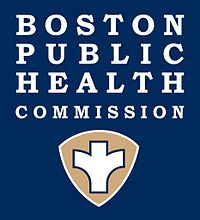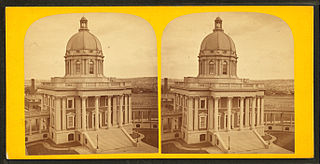
Brockton is a city in Plymouth County, Massachusetts, United States; the population was 105,643 at the 2020 United States census. Along with Plymouth, it is one of the two county seats of Plymouth County. It is the sixth-largest city in Massachusetts and is sometimes referred to as the "City of Champions", due to the success of native boxers Rocky Marciano and Marvin Hagler, as well as its successful Brockton High School sports programs. Two villages within it are Montello and Campello, both of which have MBTA Commuter Rail Stations and post offices. Campello is the smallest neighborhood, but also the most populous. Brockton hosts a baseball team, the Brockton Rox. It is the second-windiest city in the United States, with an average wind speed of 14.3 mph (23.0 km/h).

Milford is a town in Worcester County, Massachusetts, United States. The population was 30,379 according to the 2020 census. First settled in 1662 and incorporated in 1780, Milford became a booming industrial and quarrying community in the 19th century due to its unique location which includes the nearby source of the Charles River, the Mill River, the Blackstone River watershed, and large quantities of Milford pink granite.

Dorchester is a Boston neighborhood comprising more than 6 square miles (16 km2) in the City of Boston, Massachusetts, United States. Originally, Dorchester was a separate town, founded by Puritans who emigrated in 1630 from Dorchester, Dorset, England, to the Massachusetts Bay Colony. This dissolved municipality, Boston's largest neighborhood by far, is often divided by city planners in order to create two planning areas roughly equivalent in size and population to other Boston neighborhoods.
A health department or health ministry is a part of government which focuses on issues related to the general health of the citizenry. Subnational entities, such as states, counties and cities, often also operate a health department of their own. Health departments perform food inspections and other health related inspections, vaccination programs, free STD and HIV tests, tobacco enforcement and cessation programs, and other medical assistance programs. Health departments also compile statistics about health issues within their area. The role of a health department may vary from one country to the other, but their primary objective is always the same; safeguarding and promoting health. In 1986, several of the world's national health departments met to establish an international guideline by which health departments operate. The meeting was in Ottawa, Ontario, Canada, and hence the guidelines established are known as the Ottawa Charter. The Ottawa Charter was designed to 'achieve Health for All'.

Quincy College (QC) is a public community college in Quincy, Massachusetts. It is an open admission commuter school that offers associate degrees, bachelor degrees, and certificate programs. It was founded in 1958 and enrolls approximately 4,500 students at campuses in Quincy and Plymouth, Massachusetts.
Judith Kurland was a Regional Director for the United States Department of Health and Human Services during the second Clinton administration. She was appointed by Secretary of Health and Human Services Donna Shalala in 1997.
Salem Hospital, formerly known as North Shore Medical Center, is a Level III trauma center located in Salem, Massachusetts. A member of Mass General Brigham since 1996, it offers comprehensive medical and surgical services and includes emergency/trauma departments and a birthplace. It includes Salem Hospital and the Mass General Brigham Healthcare Center in Lynn, as well as outpatient care and urgent care. The Medical Staff includes nearly 800 affiliated physicians representing primary care, family practice and 50 additional sub-specialties. It is affiliated with Tufts University School of Medicine.
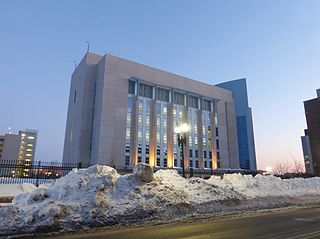
The National Emerging Infectious Diseases Laboratories (NEIDL), is a biosciences facility of Boston University located on Albany street, within the clinical and biopharma hub of the South End neighborhood of Boston, Massachusetts.
Boston Emergency Medical Services provides basic life support (BLS) and advanced life support (ALS) ambulance units throughout the neighborhoods in the city of Boston, Massachusetts, USA. Boston EMS is a public safety agency responding to 911 calls alone or with the Boston Police and/or Boston Fire Departments dependent upon the nature of an incident. The agency employs over 400 emergency medical technicians (EMT) and paramedics.
CHA Everett Hospital is a 162-bed medical/surgical and psychiatric hospital in Everett, Massachusetts. It is one of three hospitals in Cambridge Health Alliance.

Columbia Point, in the Dorchester neighborhood of Boston, Massachusetts sits on a peninsula jutting out from the mainland of eastern Dorchester into the bay. Old Harbor Park is on the north side, adjacent to Old Harbor, part of Dorchester Bay. The peninsula is primarily occupied by Harbor Point, the University of Massachusetts Boston, the John F. Kennedy Presidential Library and Museum, the Edward M. Kennedy Institute for the United States Senate, and a complex at the former Bayside Expo Center, Boston College High School, and the Massachusetts Archives. The Boston Harborwalk follows the entire coastline.
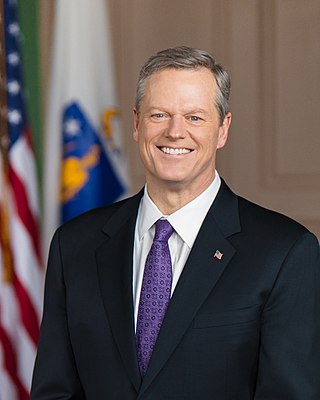
Charles Duane Baker Jr. is an American businessman and politician who is the current president of the National Collegiate Athletic Association, having served since March 1, 2023. He served as the 72nd governor of Massachusetts from 2015 to 2023 and held two cabinet positions under two previous governors of Massachusetts. He also served ten years as CEO of Harvard Pilgrim Health Care and is a member of the Republican Party.

Providence Willamette Falls Medical Center is a not-for-profit acute care hospital operated by Providence Health & Services in Oregon City, Oregon, United States. Established in 1954 as Doctors' Hospital, the hospital moved to its current location in 1961 and has 143 licensed beds at its 243,000-square-foot (22,600 m2) facility. Willamette Falls also operates several medical offices and clinics outside of Oregon City in other parts of Clackamas County. Previously known as Willamette Falls Hospital, the hospital merged with Providence in 2009.
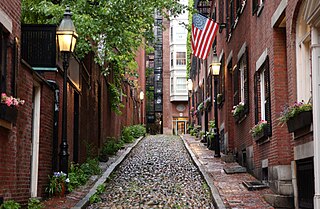
Boston, officially the City of Boston, is the capital and largest city of the Commonwealth of Massachusetts and the cultural and financial center of the New England region of the Northeastern United States. The city boundaries encompass an area of about 48.4 sq mi (125 km2) and a population of 675,647 as of 2020. The city is the economic and cultural anchor of a substantially larger metropolitan area known as Greater Boston, a metropolitan statistical area (MSA) home to 4,941,632 people as of 2020, ranking as the eleventh-largest MSA in the country. A broader combined statistical area (CSA), generally corresponding to the commuting area and including Worcester, Massachusetts and Providence, Rhode Island, is home to approximately 8.2 million people, making it the seventh-most populous in the United States.

Cannabis in Massachusetts is legal for medical and recreational use. It also relates to the legal and cultural events surrounding the use of cannabis. A century after becoming the first U.S. state to criminalize recreational cannabis, Massachusetts voters elected to legalize it in 2016.
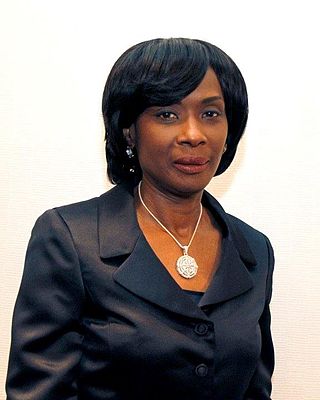
Frederica M. Williams, MBA, FCIS has served as the president and chief executive officer of Whittier Street Health Center in Boston, Massachusetts since 2002. Biography
The COVID-19 pandemic in Massachusetts is part of an ongoing pandemic of coronavirus disease 2019 (COVID-19) in the U.S. state of Massachusetts. The first confirmed case was reported on February 1, 2020, and the number of cases began increasing rapidly on March 5. Governor Charlie Baker declared a state of emergency on March 10. By March 12, more than a hundred people had tested positive for the virus. Massachusetts experienced a first wave of COVID-19 that peaked in late April 2020, with almost 4,000 people hospitalized with the disease, and a rolling seven-day average of 2,300 new confirmed cases and 175 confirmed deaths a day. A second wave began in the autumn of the same year and peaked in January 2021, seeing higher daily case numbers but fewer deaths and hospitalizations than the first wave. There was a smaller third spike of increased cases and hospitalizations in March and April 2021, which resulted in significantly fewer deaths than the first two waves. A fourth wave began in July and August 2021. Another wave occurred in the winter of 2021 to 2022, coinciding with the emergence of the SARS-CoV-2 Omicron variant in the state, and exceeding the peak number of cases in any previous wave. As of January 13, 2022, Massachusetts was experiencing a rolling average of 13,314 new confirmed cases and 43 confirmed deaths per day.
The COVID-19 pandemic in Boston is part of an ongoing viral pandemic of coronavirus disease 2019 (COVID-19) in the Massachusetts city of Boston. The first confirmed case was reported on February 1, 2020, and the number of cases began to increase rapidly by March 8. Massachusetts Governor Charlie Baker declared a state of emergency on March 10. Mayor Marty Walsh declared a public health emergency on March 15. By March 21, more than a hundred people in Boston had tested positive for COVID-19. Most early cases were traceable to a company meeting held in late February by the biotechnology firm Biogen in Boston.
The following is a timeline of the COVID-19 pandemic in Boston.
